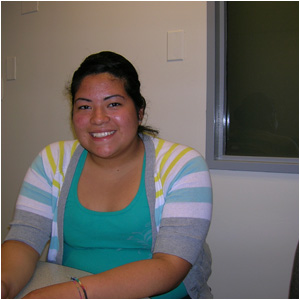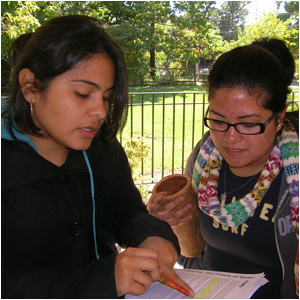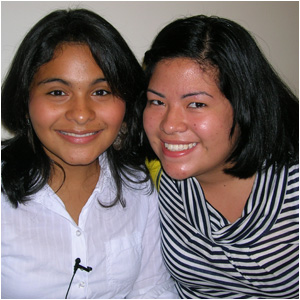Thalia Navarrete
By Catherine Winter
Thalia Navarrete's family and friends just don't get why she's going to college.
"The only people that are positive in my life are my parents," Thalia says. "They're pushing me. But other family, they're not."
Thalia says it's a cultural thing.
"My culture is that the woman, she has to do everything for the man," she says. "She has to cook, clean, everything."
Thalia is from Nicaragua, but she's lived here since she was 8, "so now I see the difference between like back in my country that the woman has to do everything. And over here, like you have a choice."
Thalia chose to enroll in Montgomery College, a community college in Maryland. But she faces a lot of challenges between here and graduation day.
Latinos are the fastest-growing segment of the United States population, but they are the least likely to have college degrees. Thirteen percent of Hispanics in the United States have a bachelor's degree or higher, compared to 53 percent of Asians, 33 percent of non-Hispanic whites and 20 percent of African-Americans.
It's not that Latinos don't go to college. These days, most of those who graduate from high school do go to college - usually community college.
But most of them don't graduate.
One reason is that, like Thalia, many students didn't learn enough in high school to prepare them for college. Thalia is angry about that.
"They don't teach you anything," she says. "The teachers don't care. They just, like, let you sleep in class in high school….
"Then when you come to college, it's like, damn, you know, I didn't learn anything in high school, and now I have to pay for it."
Most community college students have to take remedial classes before they can enroll in college-level classes for credit. Experts say that's one reason so few make it to graduation. They use up too much time and money taking remedial classes. A so-called two-year degree takes the typical student three and a half years to complete.
"You get your hopes up, saying, 'Wow, in two years, I'm out. I can move on to another college,'" says Thalia. "But it's all a lie."
Thalia never applied for financial aid. Many students who qualify for aid don't realize they do, and pay out of pocket. Thalia says her parents are paying for her schooling.
"I see the struggle they have, and sometimes I want to get a job to help them, but my mom, she doesn't want me to work," Thalia says.
She says she had a job for a couple of weeks, but when her mom saw how tired she was, she urged her to quit. "She even cried 'cause she said she doesn't want me to work like she does. She wants me to get an education and then work."
Thalia's mother didn't finish middle school, but Thalia's clearly proud of her. She says her mom worked her way up from being a dishwasher to being the head chef at a catering company. "She runs like everything," she says.
Her dad's a mechanic and owns a towing company. He wanted to go to college when he arrived in the United States, but he couldn't afford it. "So now that I have the opportunity, he's always telling me, like, 'Go to school, do your work, because I don't want you to be like me.'"
Thalia says her parents worked two jobs at a time to save money to buy a house. She remembers seeing her mother come home from work with feet so swollen she couldn't stand. She hopes that going to college will mean she can support herself with just one job - and even take care of her parents when they get older.
"That's what I want for me," she says. "I see myself working and being like a professional woman and independent and helping my parents out. I don't really see myself getting married."
Thalia wants children someday, but she's not so sure about the husband thing. She says Latino men want their wives to do all the housework. Her best friend, Katy Sorto, shares her skepticism about marriage - although Katy is already engaged. Katy's family comes from El Salvador.
"All men are the same," Katy says. "Just the same. The same, the same, the same."
Katy and Thalia say a lot of the girls they know get pregnant while they're still in high school.
"If you [make] it, you know, past high school, it's a big deal," Thalia says.
"It is a big deal," Katy says. "If you go to college or anything. And you don't have kids. You made it. You made it."
Katy is taking classes at Montgomery College, too. Both young women say they see college as a ticket out of a life in a little apartment with a demanding man and babies.
"We want something better," says Thalia. "Even though people may say that we're not gonna make it and all this stuff-"
"They're jealous," Katy puts in.
"-we try."
Thalia says she thinks about giving up on college nearly every day.
But she also says a year of college has been good for her. She's learned to write better and express herself more clearly.
"Because here, I'm around people that actually want to be successful and be independent," she says. "And I'm surrounding myself with people that have bigger vocabularies and stuff. And it's helping me."
She says she's gotten interested in politics for the first time, "because I feel like if my classmates, they know, why shouldn't I know? Like, we're in the same position, so I want to be up to their level or more."
Thalia says she used to be shy, but now she speaks up in class. She feels like she's come a long way from the days when she couldn't speak English and was afraid to talk.
"I raise my hand, and I say stuff," she says, "and it feels good to have people look at you and say, 'Wow, you know stuff.'"
Back to Rising by Degrees.



